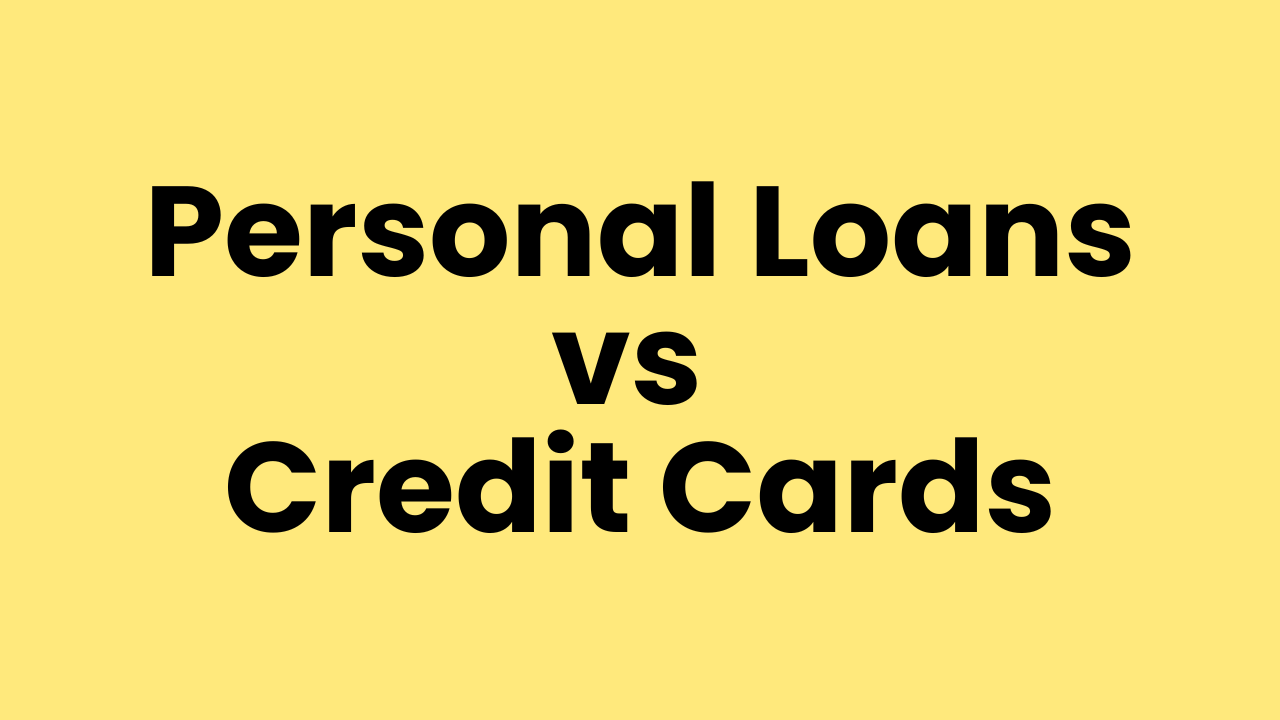Managing finances effectively often requires access to credit. Two popular options for borrowing money are personal loans and credit cards. While both can provide financial flexibility, they are suited to different purposes and come with distinct advantages and drawbacks. In this article, we’ll explore personal loans and credit cards in depth to help you decide which option is better for your financial needs.
Understand Personal Loans
A personal loan is a lump sum of money borrowed from a financial institution that you repay in fixed monthly installments over a specified period. Personal loans typically have a fixed interest rate, making them predictable and easier to budget for.
Features of Personal Loans
- Fixed Loan Amount: You borrow a specific amount of money, typically ranging from ₹50,000 to ₹10 lakhs or more, depending on your eligibility.
- Repayment Tenure: Personal loans have a fixed repayment tenure, generally ranging from 1 to 5 years.
- Interest Rates: Interest rates for personal loans in India usually range between 10% and 24%, depending on your credit score and the lender.
- Purpose: Personal loans can be used for various purposes such as medical emergencies, weddings, vacations, or consolidating debt.
- No Collateral Required: Personal loans are unsecured, meaning you don’t need to provide any asset as collateral.
Pros of Personal Loans
- Predictable Payments: Fixed EMIs make budgeting easier.
- Larger Loan Amounts: Suitable for big-ticket expenses.
- No Collateral: No risk of losing assets.
Cons of Personal Loans
- Approval Time: Processing can take a few days to weeks.
- Prepayment Charges: Some lenders charge penalties for early repayment.
- Higher Eligibility Requirements: A good credit score and stable income are crucial.
Understand Credit Cards
A credit card allows you to borrow money up to a pre-approved credit limit. Unlike personal loans, you can use a credit card repeatedly as long as you repay the borrowed amount.
Features of Credit Cards
- Credit Limit: The borrowing limit is predetermined by the card issuer based on your income and creditworthiness.
- Revolving Credit: You can use the card repeatedly as long as you stay within the credit limit and make timely repayments.
- Interest-Free Period: Most credit cards offer an interest-free period of 20 to 50 days for purchases, provided you pay the outstanding amount in full by the due date.
- Interest Rates: Credit cards typically have high interest rates, ranging from 24% to 48% annually, if balances are not paid in full.
- Additional Benefits: Many credit cards offer rewards, cashback, and discounts on shopping, travel, and dining.
Pros of Credit Cards
- Convenience: Instant access to credit.
- Rewards and Perks: Cashback, reward points, and discounts.
- Interest-Free Period: Short-term credit at no cost if paid on time.
- Emergency Usage: Quick access to funds without approval delays.
Cons of Credit Cards
- High Interest Rates: Unpaid balances accrue interest at steep rates.
- Overspending Risk: Easy access to credit can lead to impulsive spending.
- Debt Trap: Paying only the minimum due can result in significant debt over time.
Differences Between Personal Loans and Credit Cards
Aspect | Personal Loans | Credit Cards |
|---|---|---|
Purpose | Ideal for large, planned expenses | Suitable for short-term or recurring expenses |
Loan Amount/Credit Limit | Higher amounts, typically ₹50,000 to ₹10 lakhs | Lower limits, based on income and credit score |
Interest Rates | Lower, usually 10% to 24% | Higher, typically 24% to 48% |
Repayment Tenure | Fixed tenure (1 to 5 years) | Flexible, revolving credit |
Collateral | No collateral required | No collateral required |
Application Process | Requires documentation and approval | Quick and easier approval |
Rewards/Perks | None | Cashback, rewards, and discounts |
Prepayment Charges | May apply | Not applicable |
When Should You Choose a Personal Loan?
- Big-Ticket Expenses: If you need a significant amount of money for a wedding, home renovation, or medical emergency, a personal loan is a better choice due to its higher borrowing limit.
- Debt Consolidation: Personal loans can be used to consolidate high-interest debts, such as credit card balances, into one manageable monthly payment at a lower interest rate.
- Predictable Repayments: If you prefer fixed monthly payments and a structured repayment schedule, personal loans provide clarity and ease in budgeting.
- Longer Repayment Period: For expenses that require more time to repay, personal loans offer a longer tenure compared to credit cards.
When Should You Use a Credit Card?
- Short-Term Expenses: For smaller, recurring, or short-term expenses like groceries, utility bills, or online shopping, credit cards are more convenient.
- Rewards and Perks: If you frequently shop online, travel, or dine out, credit cards can provide significant cashback, discounts, and reward points.
- Emergency Funds: In situations requiring immediate access to funds, credit cards are quicker and more accessible than personal loans.
- Building Credit Score: Responsible usage of credit cards (paying bills on time and in full) can help you build and maintain a good credit score.
Common Scenarios: Personal Loans vs. Credit Cards
Scenario 1: Planning a Wedding
- Personal Loan: A better option because it provides a lump sum amount with a fixed repayment schedule.
- Credit Card: May not offer a sufficient credit limit for a large expense.
Scenario 2: Paying for a Vacation
- Personal Loan: Suitable for an expensive trip planned in advance.
- Credit Card: Ideal for booking tickets, hotel stays, and other smaller expenses to earn rewards and cashback.
Scenario 3: Emergency Medical Expense
- Personal Loan: Useful for planned medical procedures or large hospital bills.
- Credit Card: More effective for immediate payments during emergencies.
Scenario 4: Consolidating Debt
- Personal Loan: Better for consolidating high-interest credit card debt into a lower-interest single loan.
- Credit Card: Not ideal due to high interest rates on balances.
Factors to Consider Before Choosing
- Purpose of Borrowing: Define whether the expense is short-term or long-term.
- Loan/Credit Amount: Check if the required amount fits within your credit card limit or requires a larger loan.
- Interest Rates: Compare interest rates for both options. Personal loans usually have lower rates than credit cards.
- Repayment Capability: Assess your ability to repay within the given time frame. Personal loans have fixed terms, whereas credit cards require discipline to avoid rolling balances.
- Eligibility: Ensure you meet the lender’s requirements for credit score, income, and documentation.
So Finally: Which Is Better?
The choice between a personal loan and a credit card depends on your financial situation and the purpose of borrowing:
- Choose a Personal Loan for large, planned expenses or debt consolidation where you need a fixed amount and structured repayments.
- Choose a Credit Card for smaller, recurring expenses or situations where you can repay the amount within the interest-free period.
Both options have their merits and drawbacks. The key is to understand your financial needs and choose the option that aligns with your goals, repayment capability, and financial discipline. Always compare interest rates, fees, and terms before making a decision to ensure you’re getting the best deal.

Ranjan is a dedicated finance writer for smartfinclub.com, where he specializes in comparing top financial products in India, including loans, credit cards, savings accounts & more. With a focus on providing clear insights into features, rates, and benefits, Ranjan aims to empower readers to make informed financial decisions customized to their needs.

